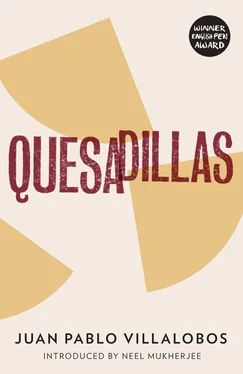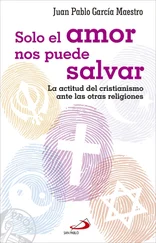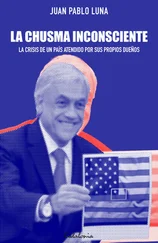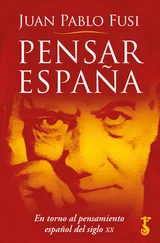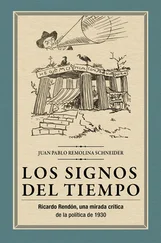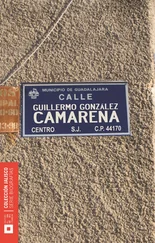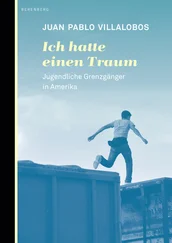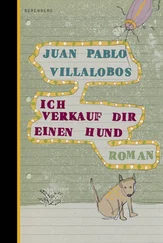In spite of his outrageous claims, Aristotle’s theories lacked originality. He had plagiarised them straight from the magazines his only schoolfriend lent him. This was the other big novelty in my brother’s life: he now had a friend, whose nickname was Epi, although he hardly counted because my brother was more his nurse than a friend; our teachers had enlisted Aristotle to go everywhere with the boy. Epi suffered from epileptic fits and Aristotle had been entrusted with a little device with a button he had to press in case of a seizure.
Epi’s magazines specialised in belittling the inhabitants of planet Earth. All of humanity’s advances and great works were explained by the presence of extraterrestrials. The Mayan and Egyptian pyramids, the Phoenician sailing routes, the great inventions of the Chinese, the philosophical systems of ancient Greece: all were gifts from beings who had come from the stars. On the letters pages, readers told of abductions, UFO sightings and extraterrestrial genetic experiments. This was where Aristotle found the final piece for his jigsaw puzzle: the value our little brothers’ genes would have for the aliens, due to their being pretend twins.
‘They’re collecting all kinds of specimens. Tall people, short people, fair people, dark people, women, men, children, redheads, albinos, twins, triplets …’
‘And why do they take them?’
‘Why do you think? To cross them, to do experiments on them!’
The puzzle Aristotle had put together had pieces from many different places, forcibly assembled with the tenacity of desperation. The resulting image was chaotic, amorphous; disconnected shapes that instead of suggesting a meaning only sustained an absurdity. It was exactly what we needed: it was the map that would guide our footsteps.
It took us a while to put the plan into action because it depended on the coincidence of various external factors: on my father’s absence from home, on the relaxation of maternal supervision, on my younger siblings being otherwise entertained and on the neighbours being away. It seemed impossible, almost as impossible as the pretend twins having been abducted by aliens, but one day it happened, a day on which the law of probability decided to come down on our side. Before setting off, we jumped over the Poles’ garden wall, got into their house through the utility room and stole two rucksacks that we stuffed with provisions from the store cupboard. Oreos! Up yours, Jarek. We didn’t stick around to have a siesta, but we did at least take some blankets.
We fled the scene looking over our shoulders, practically running backwards. We could have gone without looking back, it would have had a more poetic impact, but it wouldn’t have been right: we had to make sure no one was following us. As a farewell view it was very depressing: our crummy little shoebox and the Poles’ mansion. Seen from a distance, our house looked like the Poles’ dog kennel — no, not even that. Or maybe, provided that the dog had died and hadn’t been replaced.
As well as thinking about our escape — sketchy, disjointed thoughts, to match the puzzle — and concentrating hard on trying to control my erratic cardiovascular functions, I couldn’t stop thinking about my younger siblings, the ones still at home. Now they’d be a svelte, three-child family, the lucky bastards; they’d be up to their necks in quesadillas and they hadn’t even done anything to deserve it. Would they be middle class at last?
Instead of heading straight down to the road that led to the town — a continuation of the San Juan highway — we walked cross-country, to avoid human contact, which meant we had to push our way through thousands of acacia trees. The town was so Catholic it was encircled with thorns. When we finally rejoined the road that would take us down to the highway, we saw the floods of people filling the road and heard the dishevelled racket of their chants. This was the first impression they gave, one we verified immediately: that such a racket could only come from a mob with dishevelled hair.
‘ I will praaaaaise, I will praaaaaise, I will praaaaaise, I will praaaaaise, I will praaaaaise my Lord.
‘ It’s the grieeeeevances and praaaaaaaayers of your chiiiiiiildren of San Juaaaaaaaaaan. ’
‘Pilgrims — perfect!’ exclaimed Aristotle, delighted at the idea of joining the tuneless procession.
‘You like pilgrims?’
‘Don’t be stupid. This way no one’ll see us. We just slip in among them and walk to the bottom of the Mesa Redonda, then branch off.’
We joined the crowd of pilgrims, although to me it seemed we’d slipped in among a crowd of smells: a stink of sweat and another of urine, a belch of rotten egg and another of rancid beans. I looked to one side and saw the stumps of an old man with no arms who was crawling along on his knees. I looked down and found a mangy dog trying to jump up and steal my Oreos. Babies wrapped in rags hung from their mothers’ backs. Moving through the images and the smells, floating on another plane of supernatural discord, was the disparate drone of dozens of different chants. It was incomprehensible that the pilgrims weren’t all chanting the same thing, that each person was following his or her own inspiration; could it be some kind of mystical rapture? If so, it was extremely out of tune.
I didn’t have a mirror with me so I couldn’t see my own face, but it must have been a fucking expressive one.
‘What is it, man? Haven’t you ever seen poor people before?’
‘Poor people? We’re poor.’
‘Don’t be stupid.’ To this day I still find the reality check that this admonishment was supposedly meant to prolong simply delightful. ‘We’re middle class.’
My brother didn’t like being poor, but the poverty of the pilgrims all around us didn’t modify our own. At the most it left us classified as the least poor of this group of poor people, which merely proved that one could always be poorer and poorer still: being poor was a bottomless well.
On leaving Lagos, the first impression one had was that the apologists of journeys and nomadism had not passed this way. The landscape was the same as on our Cerro de la Chingada: acacias and more acacias, flocks of wood pigeons, dust clouds. Every few kilometres the monotony would suffer the appearance of a tyre repair shop or a garage, precariously constructed from planks of wood and metal sheets. Their signs and adverts managed an average of two spelling mistakes in words of five and a half letters. Nagged by the memory of the highway to La Chona, which was identical, an insatiable anxiety began to consume me: did the whole world look the same?
Were there acacia trees in Poland?
What about Disneyland?
Aristotle had no doubts about the probable homogeneity of planet Earth; that was why he was the older brother. Or perhaps he did but he was avoiding them by keeping himself entertained, from one conversation to the next; indeed, his strategy for going unnoticed looked highly illogical to me. He was repeating to all and sundry that we were on our way to San Juan to ask the Virgin to make the pretend twins appear, and that in exchange we were offering the sacrifice of our pilgrimage.
‘You see?’ he whispered in my ear after giving me a wink that was meant to show what a genius he was. ‘It’s perfect, because it’s not true yet, but it’s not a lie yet either.’
‘What?’
‘Yeah, man, when we turn off it’ll be a lie that we’re going to see the Virgin, but in the meantime it could be true. I’m not telling lies, you get me, arsehole?’
At that moment a whole load of Greeks were spinning in their graves. The pilgrims said yes, surely the Virgin would perform a miracle for us, and they declared this with such absolute determination that it was almost possible to see the pretend twins already, to tousle their hair or hear how they stayed completely silent just like they always did. One devout old woman cried that the dear Virgin had cured her dengue fever, another that the virgencita hadn’t saved her husband but she had taken him to heaven, even though he didn’t deserve it for being an argumentative drunk. You never know! You never know when you might need the virgencita , repeated the walkers representing current misfortunes, those who at that very moment had a relative at death’s door. There was a group that specialised in mourning those who’d crossed over to the other side — but not to death, just to the United States: Look after them, virgencita ! Give them work! Bring them home soon! Disneyland, pure and fucking simple, right? Quite a few of them were pre-emptive pilgrims, who up to now hadn’t needed a big miracle, just little ones, favours (which they could easily have requested from entities of a less noble pedigree; just asking for a boyfriend wasn’t a matter to bother the Virgin with, there were a shitload of saints for that). These pilgrims were gradually accumulating credits for when life played one of its classic dirty tricks on them. There was also an army of children, who were wasted because they weren’t asking for anything. They didn’t know how, they hadn’t yet been taught how to invoke other-worldly figures; they just acted like stray dogs, following crowds with fanatical obedience. In any case, it was impossible to tell if the dogs were praying, but it was clear they were loving the chaos.
Читать дальше
